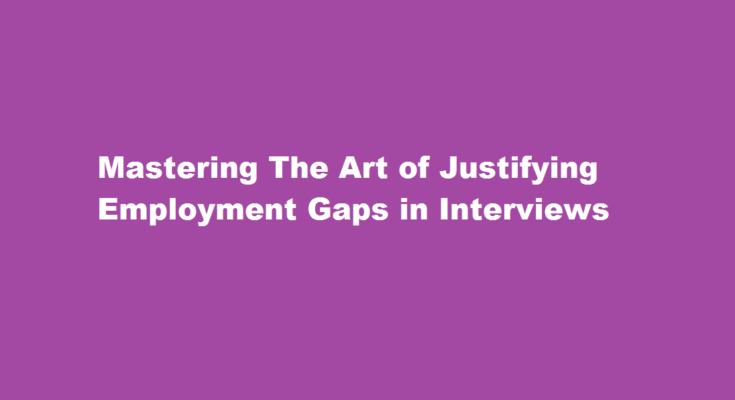Introduction
An interview is an opportunity to present oneself as a desirable candidate for a job, but what happens when there are gaps in your employment history? Employment gaps can be due to various reasons, such as personal commitments, further education, or career exploration. The key is to approach these gaps strategically and present them in a positive light during interviews. In this article, we will discuss effective ways to justify employment gaps and enhance your chances of securing your dream job.
Acknowledge and Prepare
The first step in justifying employment gaps is to acknowledge them openly and honestly. Take time to reflect on the reasons behind the gaps and identify any skills or experiences gained during that period. Once you have a clear understanding of your situation, you can prepare a concise explanation. Avoid fabricating stories or hiding the truth, as this may raise concerns about your honesty. Instead, focus on presenting a compelling narrative that showcases personal growth, learning, or valuable experiences gained during the gap.
Highlight Personal Development
Employers value candidates who actively pursue personal growth and development. If you took time off to explore new opportunities, learn new skills, or engage in volunteer work, emphasize these experiences during the interview. Discuss any relevant courses, certifications, or projects you undertook to enhance your knowledge and skills. By highlighting your proactive approach to self-improvement, you demonstrate a strong work ethic and a commitment to continuous learning.
Freelancing and Contract Work
During employment gaps, many individuals take up freelance or contract work to stay productive and gain experience. If you engage in such work, emphasize the projects you undertook, the clients you collaborated with, and the skills you acquired. Discuss how these experiences contributed to your professional growth and problem-solving abilities. This will demonstrate your adaptability, self-motivation, and ability to manage your time effectively.
Address Personal Commitments
Sometimes, employment gaps are due to personal commitments such as raising a family, caring for a loved one, or pursuing further education. While it is not necessary to divulge personal details, you can briefly mention that you took time off to attend to important family matters or to pursue advanced education. Emphasize the transferable skills you acquired during this period, such as time management, organization, and multitasking. Employers value individuals who can successfully balance their personal and professional lives, so framing your gap in this light can work to your advantage.
Networking and Skill Enhancement
Networking and skill enhancement activities can greatly contribute to your employability during employment gaps. Mention any industry-related events, conferences, or workshops you attended to expand your professional network and stay updated with the latest trends. Discuss how these networking opportunities facilitated knowledge exchange, provided insights into industry best practices, and allowed you to establish valuable connections. Furthermore, emphasize any efforts you made to enhance your skill set through online courses, self-study, or mentorship programs. Highlight the relevance of these activities to the position you are applying for and how they have kept you engaged and motivated in your professional journey.
FREQUENTLY ASKED QUESTIONS
What is the best reason for the gap?
furthering your education. taking time off for a medical reason. relocating from one area to another. spending time on personal development.
Should I explain a gap in my resume?
DO show the gap in your resume, but explain it briefly. In two lines or less, simply state what you were doing. See the employment gap example below. DON’T cover gaps in resumes with dates.
Is a 2 month employment gap bad?
ANS: Picking up work again shows continuity, even to nosy employers. The average job search is over 4 months, so 2 months doesn’t seem odd. The fact that you rejoined the same company shows you had a good relationship with the employer, so the 2 months is nothing to worry about. People take breaks all the time.
Conclusion
Employment gaps are not insurmountable obstacles. By approaching them strategically and showcasing your personal and professional growth during those periods, you can successfully justify them in job interviews. Remember to be transparent, honest, and confident while explaining the gaps. Focus on the valuable experiences gained, personal development activities undertaken, and any accomplishments during that time. By effectively addressing employment gaps, you can demonstrate your resilience, adaptability, and commitment to continuous improvement, increasing your chances of securing the job you desire.
Read Also : Mastering The Art of Juggling A Guide to Successfully Juggling Three Balls



